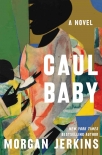Caul Baby, Morgan Jerkins [romantic novels in english TXT] 📗

- Author: Morgan Jerkins
Book online «Caul Baby, Morgan Jerkins [romantic novels in english TXT] 📗». Author Morgan Jerkins
A child was screaming from inside the brownstone, but her voice was quickly muffled. Amara saw the curtains rustling from the front-facing windows and lifted her head in an attempt to get a closer look, to no avail. She heard the lock being disengaged and ran off to the side, far enough not to look suspicious but still close enough to see who would be coming out of that brownstone. A white couple held hands while descending the porch steps. They giggled excessively like coquettish schoolchildren. The man was holding a small gift box that the woman could not take her eyes off of, and she pressed her fists to his chest, saying, “Oh, please, please. I can’t wait. I just cannot. I must have it now.”
Amara leaned forward with sweaty palms and armpits. She held her breath and waited.
“All right, all right, darling,” the man said, to which his wife joyously clapped her hands together.
When the man faced his wife, Amara could not see what was happening. But in less than a minute, he turned to face the street again and Amara could see a cork-like membrane around her neck. She couldn’t parse out all its details, but whatever it was looked thin and light. She released her breath in one sharp gasp once she came to the realization of what it was. “Aunt Lay was right. Aunt Lay was right. Fuck!” Amara said to herself. Now all she could hear were the voices of the new mother from the convenience store and her beloved aunt Laila. It was not easy being a Black mother, and Black mothers were not the Melancon women’s clientele. They were too busy serving white people who, by the looks of that man’s crisp suit and his wife’s wool trench coat and diamond brooch, were well off. She wasn’t sure if she was more mad at the bias or the fact that this practice was allowed at all, but nevertheless, she marched straight over to the 32nd Precinct, where every officer was occupied with answering phone calls about some petty crime in one corner of Harlem or a violent crime in another. Papers were flying everywhere, some officers were grumbling under their breath, and the atmosphere carried a heavy scent of ash and powdered donuts.
One burly Black woman with a swagger in her walk and a broad grin was slowly making her way over to her desk with the lightest stack of papers in her hand.
“Hey, excuse me.” Amara made a beeline for her and breathed a sigh of relief when the woman stopped. “I have a complaint.”
The lady, whose tag said ROBINSON, scoffed. “Chile, everyone has a complaint. But come on, pull up a chair.” They sat over at her corner desk, and Amara felt guilty when she saw several other stacks on its surface. Officer Robinson placed her folded hands on one of said stacks and leaned forward. “What’s up, sweetheart?”
“Lemme ask you something: You’re not allowed to just sell products out of your home, right?”
“There’s nothing illegal about being an entrepreneur. People start their own businesses from their kitchens, for God’s sake.”
“No, no, no, not like that. Not that type of product.”
“Drugs?”
“No, I mean . . . people’s bodies.”
“Prostitution? So it’s a brothel.”
“No. Well—I—” Amara stopped and took a deep breath. “Can I ask how long you have been working in Harlem?”
“Born and raised. I grew up right around the corner from here.”
“So do you know about the Melancon women?”
“Oh boy,” Officer Robinson said in a singsong voice then leaned back in her seat.
“What?”
“My advice is to leave it alone. You’re in over your head.”
“What do you mean?”
“We’ve been getting complaints from the community for as long as I’ve been here, and even longer than that. Sometimes you have officers like me who try to help, but it feels like a fool’s errand.”
“Complaints? So there’s more than one?”
“Plenty more. A whole lotta Black women been getting sick, losing babies, and everything—and they blame it all on those Melancons. I don’t believe in correlation actually implying causation. But it does make you wonder who they are giving the caul to if not the women of this neighborhood. We tried to pour some resources into an investigation after one particular case, though. There was one woman not too long ago who was screaming and ripping at her clothes, accusing them of not helping her or something and her child dying. Very woo-woo if you don’t believe in that stuff. And woo-woo is hard to translate into an indictable offense.” Officer Robinson wanted to continue speaking until she saw tears pooling in Amara’s eyes. “You okay, sweet?”
Amara sniffled and hurriedly wiped her eyes. “Yeah, I’m fine. Um—” She cleared her throat. “How can you translate that into an indictable offense, as you say?”
“The state legislative process, for one, or you need a prosecutor.”
Amara’s heart fluttered. “A prosecutor.”
“Mm-hmm. But you need a real tight-ass. No one flimsy. Believe me. They’re tough cookies. You need someone high-level. Hell, maybe even the district attorney.”
“I see.” Amara’s voice tapered off, and her eyes wandered around the room. Then she smiled. She laid her hands flat on Officer Robinson’s desk and said, “Thank you.”
Amara left the precinct office with a new resolve and a spring in her step. She drew the cold evening air into her body, and her chest expanded with a revived ambition. Perhaps the therapist was right and she could channel her grief into something useful. If she could not stop grief from visiting, then it could be a partner alongside her political science studies, and she could work to help Black mothers like





Comments (0)